Equipment for Living by Michael Robbins

Author:Michael Robbins
Language: eng
Format: epub
Publisher: Simon & Schuster
HOOKED UP
When I was a wee bairn in the late ’70s, a mass-market paperback called The Poetry of Rock was often to be found among the macramé and marijuana seeds. This anthology was a weird little bible to me, its concordances the records that were always lying around with their mystically resonant titles—Aja, The Slider, Sticky Fingers, Dixie Chicken—and glorious gatefolds. I’d pore over lyric sheets the way Harold Bloom claims he immersed himself as a child in Blake and Hart Crane. I first embarked on literary exegesis at seven or eight, trying to understand what it could mean to know “how many holes it takes to fill the Albert Hall.”
Reading The Poetry of Rock again decades later, I’m impressed by how self-aware it is. I’d assumed I would find it a kitschy cash-in, radio wisdom for the Castaneda set, full of wimpy crap like “The Sound of Silence.” That excretion is indeed to be found within the anthology’s pages, but for the most part, editor Richard Goldstein of the Village Voice was too savvy to fall for the callow philosophizing of folkies like Paul Simon and Phil Ochs. Goldstein says of the latter’s unreadable “Crucifixion” that it is “infuriating in its insistence on expressing everything in allegorical terms.” Meanwhile, interpreting Dylan is like “running a U.S.O. in Hanoi”; Procol Harum’s lyrics “reek of random allusions and post-graduate funk”; “you can almost feel the lurch of brakes between the lines” of the Beatles’ “In My Life.”
For Goldstein, rock “poetry” is about the ability “to express the forbidden within the context of the permissible.” “Poetry” poetry, on the other hand, can sometimes express the forbidden within the context of the forbidden, because it doesn’t aspire to go platinum. (The same could be said of punk, I suppose.) Context is, of course, why the answer to the tedious question “Are lyrics poetry?” has to be “It depends.” Goldstein notes that “mere linearity can destroy a rock lyric,” and claims, despite his anthology’s title, that it’s a mistake to expect pop lyrics “to move like a poem.”
The point is pop music is music, duh, and without the Klaxon and clamor of guitars and beats, the words don’t really rock and roll.
Heard in certain ways, song lyrics are obviously a form of poetry; in other respects, it seems worthwhile to preserve a distinction. I have collections of the lyrics of W. S. Gilbert, Stephen Foster, Cole Porter, and Stephen Sondheim. What would be the point of denying these lyricists the honorific of “poet”? And I can think of songs by Randy Newman (early), Leonard Cohen (late), Laurie Anderson, and Biggie Smalls that I’d have no problem calling poems.
Still, I’ve been stranded in the dead waters of Joni Mitchell’s “Woodstock” or some other well-mannered token in a literature anthology (Morrissey’s execrable “Cemetry Gates” and Mos Def’s “Hip Hop” in the most recent Norton Introduction to Literature) often enough to question the motivation to enshrine these songs. There’s something feebly earnest about anthologies like The Poetry of Rock or Adam Bradley and Andrew DuBois’s recent Anthology of Rap.
Download
This site does not store any files on its server. We only index and link to content provided by other sites. Please contact the content providers to delete copyright contents if any and email us, we'll remove relevant links or contents immediately.
The Compound Effect by Darren Hardy(8966)
Wonder by R.J. Palacio(8580)
Atomic Habits: Tiny Changes, Remarkable Results by James Clear(8343)
Becoming Supernatural by Dr. Joe Dispenza(8217)
Wonder by R. J. Palacio(8109)
Change Your Questions, Change Your Life by Marilee Adams(7780)
The Road Less Traveled by M. Scott Peck(7603)
Born to Run: by Christopher McDougall(7127)
Daring Greatly by Brene Brown(6513)
Big Magic: Creative Living Beyond Fear by Elizabeth Gilbert(5771)
Grit by Angela Duckworth(5614)
The Slight Edge by Jeff Olson(5417)
Men In Love by Nancy Friday(5240)
The Wisdom of Sundays by Oprah Winfrey(5160)
You Are a Badass at Making Money by Jen Sincero(4930)
Fear by Osho(4738)
The Miracle Morning by Hal Elrod(4727)
The Four Tendencies by Gretchen Rubin(4601)
Rising Strong by Brene Brown(4459)
